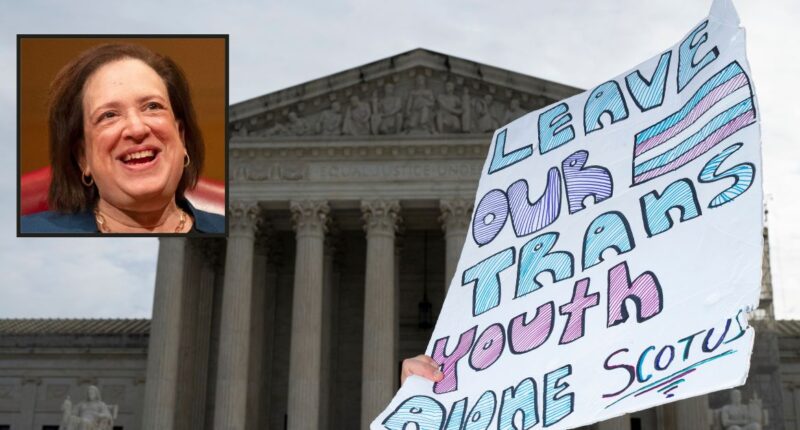
Context: UNITED STATES – DECEMBER 4: Demonstrators both supporting and opposing transgender rights gather outside the U.S. Supreme Court ahead of the United States v. Skrmetti case on Wednesday, December 4, 2024 (Bill Clark/CQ Roll Call via AP Images). In the small image: U.S. Supreme Court Justice Elena Kagan delivers a speech at an event held at the Library of Congress for the 2024 Supreme Court Fellows Program organized by the Law Library of Congress, Thursday, Feb. 8, 2024, in Washington (AP Photo/Jess Rapfogel).
The U.S. Supreme Court justices heard oral arguments Wednesday in a case with the potential to create groundbreaking legal precedent about the rights of transgender individuals to receive gender-affirming medical care.
The case centers around a Tennessee law enacted in 2023. The statute, SB1, bans both surgery intended to cure gender dysphoria as well as the prescription of hormone blockers for minors who are experiencing gender dysphoria. The law’s self-described purpose is to “protect the health and welfare of minors.”
But SB1 does not prohibit puberty-delaying medication or hormone therapy for all patients — only for those who would use the treatment to depart from a minor’s sex assigned at birth. Young people who use treatments to treat early or delayed puberty are still permitted to use the medications under the law.
The Tennessee legislature noted in the legislation’s text that the state “has a legitimate, substantial, and compelling interest in encouraging minors to appreciate their sex, particularly as they undergo puberty.”
Twenty-six states currently have similar laws banning gender-affirming care. Opponents of these restrictions argue that they are particularly harmful to transgender children, as research has shown that the restrictions have a severely negative impact on their mental health.
The legal challenge
Three transgender teenagers and their parents filed a case, stylized as L.W. v. Skrmetti, against a number of Tennessee state officials. The litigation challenges only the portion of the statute that prohibits puberty blockers and hormone therapy — and not the portion that prohibits gender-affirming surgery. Primarily at issue is an Equal Protection Clause challenge to the law, as challengers argue that it denies medical treatment on the basis of gender.
At the district court level, the challengers succeeded. U.S. District Judge Eli Richardson, a Donald Trump appointee, determined that SB1 likely violates the right to equal protections and temporarily put the ban on hold. Richardson wrote in his ruling that puberty blockers and hormone therapy are “safe, effective, and comparable in both risk profile and efficacy to many other forms of pediatric medicine that Tennessee permits.”
On appeal, the U.S. Court of Appeals for the 6th Circuit reversed and upheld the ban, applying rational basis, the lowest standard of constitutional scrutiny to the case.
The outcome of the case has potential to dictate limits for transgender medical care across the country.
“Laws like Tennessee’s are not benign regulations of medical care; they are discriminatory efforts to exclude transgender people from the protections of the Constitution,” said Chase Strangio, co-director of the ACLU’s LGBTQ & HIV Project in a statement about the case. “These bans represent a dangerous and discriminatory affront to the well-being of transgender youth across the country and their constitutional right to equal protection under the law.”
Under the Equal Protection Clause of the 14th Amendment of the Constitution, state laws that apply differently to different groups of people are subjected to one of three levels of constitutional scrutiny, depending on what classification is at issue in the law. Legislation that draws lines based on race, religion, or national origin must pass strict scrutiny to stand.
That which draws gender-based distinctions must passed intermediate scrutiny, and any other distinctions must only pass rational basis scrutiny. Intermediate scrutiny requires a law to be struck down unless it is substantially related to an important state interest.
Strangio, who argued the case on behalf of the ACLU before the Supreme Court Wednesday, is the first openly-transgender lawyer to make arguments before the high bench.
The justices engaged in over two hours of colloquy Wednesday with lawyers representing the Biden Administration and the ACLU to challenge the statute, and one from Tennessee to uphold it. During the lengthy proceedings, only the Court’s liberal minority seemed receptive to subjecting the Tennessee law to heightened constitutional scrutiny. Justice Neil Gorsuch, who authored the landmark Bostock v. Clayton County opinion to uphold transgender rights in 2020, remained silent throughout the morning.
The Court’s right flank questioned U.S. Solicitor General Elizabeth Prelogar at length about whether, on its face, SB1 classifies people “on the basis of sex” — which would trigger heightened scrutiny. While Chief Justice John Roberts raised concerns over the role of judges in cases that involve “evolving standards” and “medical nuances,” Justice Samuel Alito pressed Prelogar about how other countries have treated transgender medical care.
Alito questioned the challengers’ contention that there is “overwhelming evidence” that puberty blockers substantially improve the psychological well-being of adolescents experiencing gender dysphoria. The justice pointed to studies conducted in the UK and Sweden that he said call that conclusion into question.
Alito also suggested that the Tennessee statute should not be considered a sex-based classification, but rather, a law that reacts to physical differences between men and women. He went on to liken the current dispute to past cases involving pregnancy — in which Alito said, “there was no equal protection problem,” based on disparate treatment between genders.
Justice Sonia Sotomayor stepped in to provide context for the concept of intermediate scrutiny and its intended purpose. She reminded that at one time, women could not hold licenses as butchers or lawyers, because legislatures thought women, “weren’t strong enough to pursue those occupations.” Sotomayor went on to list some of the serious consequences associated with prolonged gender dysphoria, just as drug addiction, suicide, and physical sickness.
Sotomayor argued that the purpose of intermediate scrutiny necessary is to ensure that neither legislatures nor “this court” make personal judgments based on sex, but rather, that laws that draw lines based on gender are examined more closely, “to ensure that those children who are going to suffer all of these consequences will be made to do so only when it’s compellingly necessary.”
Justice Elena Kagan raised yet another option for the court: to treat the law as discriminatory against transgender individuals, as opposed to one that raises a male vs. female equal protection issue. Justice Brett Kavanaugh, however, cautioned the Court not to “constitutionalize” the issue of transgender rights at a time when “the rest of the world are pumping the brakes” on transgender medical care.
Kavanaugh pivoted the discussion to the rights of transgender girls to play on girls’ sports teams, and Prelogar responded that in cases involving gender-separated spaces, there are simply different state interests at play.
Justice Ketanji Brown Jackson raised a parallel question several times during the arguments: whether Tennessee’s justifications for its statute mirrors those advanced in the 1950s and 60s in support of antimiscegenation laws.
“I wonder if Virginia could have gotten away with what it was doing if it just argued what Tennessee is arguing here,” Jackson wondered.
During colloquy with Strangio, Alito pushed back on the idea of creating a new quasi-suspect classification for transgender individuals, arguing that being transgender is not necessarily immutable. Strangio argued that though individuals’ gender identities can change over time, discordance between birth gender and gender identity does indeed satisfy the legal standard for immutability. Further, Strangio said, there are substantial reasons to confer suspect or quasi-suspect status — a designation that determines the level of scrutiny a law regarding that status would receive — on transgender people given the nature of the characteristic and the history of discrimination.
Kavanaugh argued that regardless of the level of scrutiny applied to the law, Tennessee would be called upon to defend it based on concerns for public health and safety — and that “it’s hard to weigh them,” given that there are both benefits and burdens to consider. Jackson reminded her fellow justice that those scientific arguments about the risk of transgender medical care are just the kind of arguments made by Virginia to uphold its antimiscegenation statute in Loving v. Virginia.
When Tennessee Solicitor General J. Matthew Rice argued to uphold the ban, he faced difficult questions from the Court’s liberal flank.
Sotomayor interrupted Rice’s account of the dangers of puberty blockers with, “I’m sorry, but every medical treatment has a risk — even taking aspirin.”
“The question in my mind is not, ‘do policymakers decide whether one person’s life is more valuable than the millions of others that get relief form this treatment,”” Sotomayor continued. “The question is can you stop one person of one sex from another sex from receiving that benefit.”
Kagan agreed, and snapped, “It’s a dodge to say that this is not based on sex.”
Kagan also pushed back on Tennessee’s stated purpose for the law, which Rice argued is to protect minors from irreversible medical consequences.
Kagan read from the statute’s language, and commented, “It sounds to me like ‘we want boys to be boys and we want girls to be girls.’”
You can listen to the full oral arguments here.








